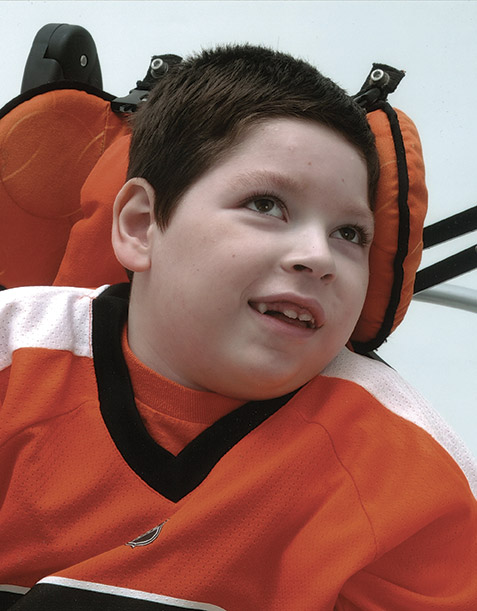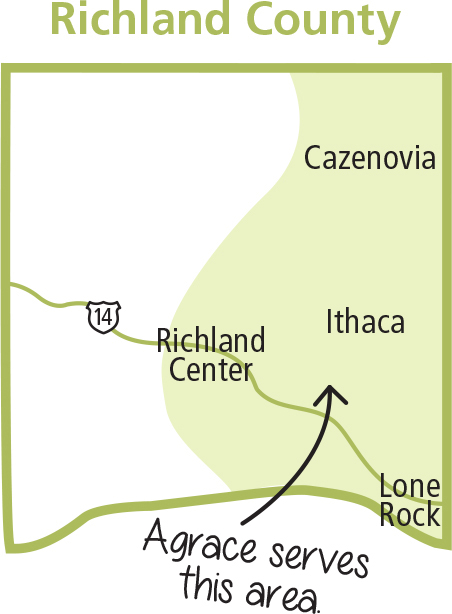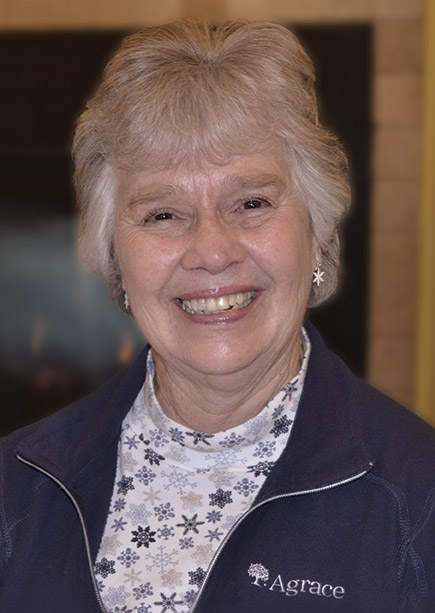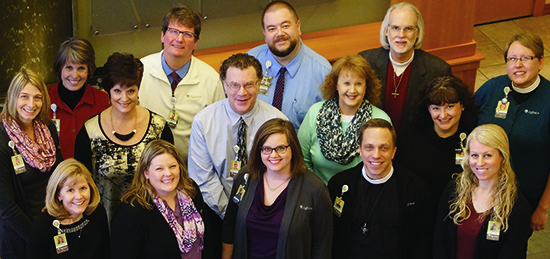Text Size
A
A
Reset Text
Questions? We're here for you.
News for Friends of Agrace
Support Helps Parents, Siblings Cope Better
Last November, 8-year-old Liam Idzi and his three brothers got to watch the pro hockey team they idolize, the Philadelphia Flyers, practice in person. Liam got a signed jersey and even took a spin around the ice with his favorite player, Jake Voracek.
It would have thrilled any hockey fan, but especially Liam—an Agrace patient. Liam has severe cerebral palsy and a seizure disorder. He uses a customized wheelchair and cannot talk or even smile, but his spirit lights up any room, says his mom, Elizabeth. Shortly after turning eight, Liam began suffering uncontrolled pain. That’s when his doctors recommended Agrace.
“It was looking really grim. We were giving Liam heavier and heavier doses of medications and they were not working—and we didn’t want him in pain,” remembers Elizabeth.
Frequent visits from Agrace nurses got Liam’s health back on track, and resolved his pain issue. These visits led to better communication and coordination of care between home, the hospital and others on his medical team. And Liam began to spend less and less time in the hospital.
“We’re all getting our life back, even Liam,” says Elizabeth. “We’re able to manage better, function better, live better with this extra layer of support. I would never have been able to consider the Flyers Make-A-Wish* trip if Agrace hadn’t been on board; it would have been too difficult.”
Elizabeth understands how some parents hesitate to bring in hospice for their child. But when life takes an unexpected turn, support may grow in an unexpected place.
She explains, “To be in this situation and say, ‘how am I going to help this child and make the rest of my family work?’ how am I going to help my children—who have a brother with all of these needs—not feel burdened because he needs so much more, how do you do that? Agrace has enabled me to stop being a nurse as much and be
able to parent more.”
“The support is amazing. Everybody functions better because of Agrace.”

 Over the years, we’ve seen something special happen each time Agrace expands our service area. Folks in nearby communities hear about our compassionate, quality care and they begin to ask for Agrace themselves.
Over the years, we’ve seen something special happen each time Agrace expands our service area. Folks in nearby communities hear about our compassionate, quality care and they begin to ask for Agrace themselves.
That’s why we began serving patients in Richland Center and eastern Richland County (including Lone Rock, Cazenovia and Ithaca) on February 1. Not only were people in Richland Center asking for Agrace, but we could see from Medicare data that less than half as many people in Richland County use hospice as in Dane County.
Volunteers needed: Do you have family or friends in Richland County who might be interested in providing companionship visits to Agrace patients? Encourage them to call (608) 327-7163 or visit agrace.org/volunteer for information.

“I honor my mother’s memory by volunteering and consider it a privilege to be a part of someone’s end-of-life journey. I find the time I spend as an Agrace volunteer so rewarding.”
“I provide companionship for patients, respite for their caregivers and a caring presence for actively dying patients through Agrace’s Vigil Volunteer program.”
“I feel especially good about the caregiver relief I provide to families. Knowing that I have been able to give someone time to take care of themselves so they can be present for their loved one, well, that’s just the best.”
Agrace needs more home care volunteers like Donna. To see how you can support Agrace’s mission by volunteering, call (608) 327-7163 or visit agrace.org/volunteer.
 When hospice patients are struggling with questions of spirituality, having a professional listener can be comforting. Bob, 90, recently explained the value of confiding in Erin, his Agrace spiritual & grief counselor: “I unloaded on her. I told her things I wouldn’t tell my own kids,” he says. “Erin’s a good listener. I can tell her things from my heart.”
When hospice patients are struggling with questions of spirituality, having a professional listener can be comforting. Bob, 90, recently explained the value of confiding in Erin, his Agrace spiritual & grief counselor: “I unloaded on her. I told her things I wouldn’t tell my own kids,” he says. “Erin’s a good listener. I can tell her things from my heart.”
Agrace’s spiritual & grief counselors (at right) help patients and family members talk about feelings of sadness, loneliness, regret, loss, forgiveness and anger—as well as questions of faith, belief and spirituality. Their support is guided by the patient’s and family’s beliefs, requests and needs. It is sometimes simply a quiet conversation at a patient’s bedside, but our counselors can also offer a blessing or prayer, read from scripture, or help a patient or family connect with a local faith community or spiritual leader.
More than half of Agrace’s spiritual & grief counselors are ordained, but they are non-denominational in their role with us. That means they care for people of any religious faith or spiritual practice—and with people who do not have formal religious beliefs. They are a caring presence whose support can be deeply meaningful in a profound, spiritual time of life.
©2024 Agrace - All Rights Reserved. | Privacy Policy